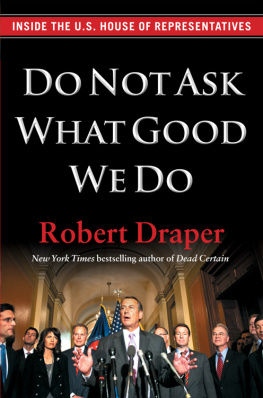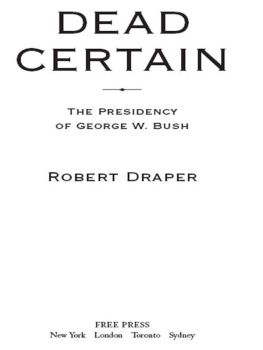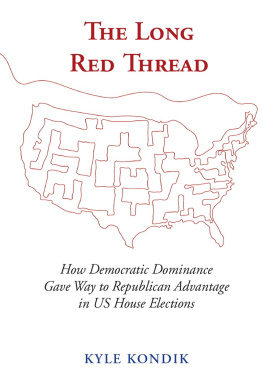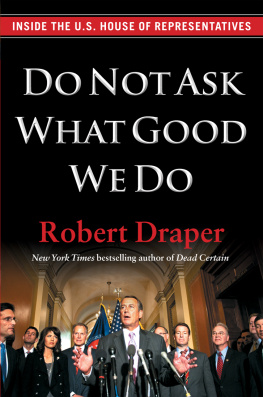Draper - Do not ask what good we do : inside the U.S. House of Representatives
Here you can read online Draper - Do not ask what good we do : inside the U.S. House of Representatives full text of the book (entire story) in english for free. Download pdf and epub, get meaning, cover and reviews about this ebook. City: New York, United States, United States, year: 2012, publisher: Free Press, genre: Detective and thriller. Description of the work, (preface) as well as reviews are available. Best literature library LitArk.com created for fans of good reading and offers a wide selection of genres:
Romance novel
Science fiction
Adventure
Detective
Science
History
Home and family
Prose
Art
Politics
Computer
Non-fiction
Religion
Business
Children
Humor
Choose a favorite category and find really read worthwhile books. Enjoy immersion in the world of imagination, feel the emotions of the characters or learn something new for yourself, make an fascinating discovery.
- Book:Do not ask what good we do : inside the U.S. House of Representatives
- Author:
- Publisher:Free Press
- Genre:
- Year:2012
- City:New York, United States, United States
- Rating:5 / 5
- Favourites:Add to favourites
- Your mark:
Do not ask what good we do : inside the U.S. House of Representatives: summary, description and annotation
We offer to read an annotation, description, summary or preface (depends on what the author of the book "Do not ask what good we do : inside the U.S. House of Representatives" wrote himself). If you haven't found the necessary information about the book — write in the comments, we will try to find it.
Robert Draper explores this question just as he examined the Bush White House in his 2007 New York Times bestselling book Dead Certain: The Presidency of George W. Bushby burrowing deeply inside the subject, gaining cooperation of the major players, and producing a colorful, unsparingly detailed, but evenhanded narrative of how the House of Representatives became a house of ill repute. Drapers cast of characters spans the full spectrum of political experience and ideologiesfrom the Democrat Dingell, a congressman since 1955 (though elbowed out of power by the partys House leader, Nancy Pelosi), to Allen West, a black Republican Tea Party sensation, former Army lieutenant colonel, and political neophyte with a talent for equal opportunity offending. While unspooling the boisterous, at times tragic, and ultimately infuriating story of the 112th Congress, Draper provides unforgettable portraits of Gabrielle Giffords, the earnest young Arizona congresswoman who was gunned down by a madman at the beginning of the legislative session; Anthony Weiner, the Democrats clown prince and self-made media star until the New Yorker self-immolated in a sex scandal; the strong-willed Pelosi and her beleaguered if phlegmatic Republican counterpart, House Speaker John Boehner; the affable majority whip, Kevin McCarthy, tasked with instilling team spirit in the iconoclastic freshmen; and most of all, the previously unknown new members who succeeded in shoving Boehners Republican Conference to the far right and thereby bringing the nation, more than once, to the brink of governmental shutdown or economic default.
In this lively work of political narrative, Draper synthesizes some of the most talked-about breaking news of the day with the real story of what happened behind the scenes. This book is a timely and masterfully told parable of dysfunction that may well serve as Exhibit A of how Americans lost faith in their democratic institutions.
***
Congress will rise June 1st, as most of us expect. Rejoice when that event is ascertained. If we should finish and leave the world right side up, it will be happy. Do not ask what good we do: that is not a fair question, in these days of faction.Congressman Fisher Ames, May 30, 1796
In Do Not Ask What Good We Do, Robert Draper captures the prophetic sentiment uttered by Fisher Ames over two centuries ago. As he did in writing about President George W. Bush in Dead Certain, Draper provides an insiders book like no one else canthis time, inside the U.S. House of Representatives. Because of the bitterly divided political atmosphere we live in, because of the combative nature of this Congress, this literary window on the backstage machinations of the House is both captivating and timelyrevealing the House in full, from the process of how laws are made (and in this case, not made) to the most eye-popping cast of lawmakers Washington has ever seen
Draper: author's other books
Who wrote Do not ask what good we do : inside the U.S. House of Representatives? Find out the surname, the name of the author of the book and a list of all author's works by series.











